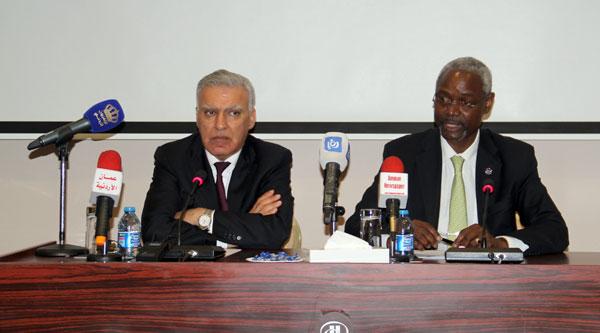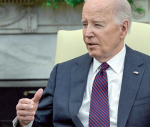You are here
UN urges world to ratify convention on mercury
By Hana Namrouqa - Mar 10,2016 - Last updated at Mar 10,2016

Environment Minister Taher Shakhshir and UN Environment Programme Deputy Executive Director Ibrahim Thiaw speak at the seventh session of the Intergovernmental Negotiations Committee on Mercury at the Dead Sea, on Thursday (Photo by Osama Aqarbeh)
DEAD SEA — As world nations convened on Thursday to agree on the fine details of the Minamata Convention on Mercury, the UN urged countries to ratify it to expedite its implementation.
Adopted in 2013, the global treaty has been signed by 128 countries and ratified by 23 nations so far, but in order to enter into force, the treaty needs to be ratified by 50 countries this year.
When it goes into effect, the convention will ban new mercury mines, phase out existing ones, control measures on air emissions, and put into force an international regulation of the informal sector for artisanal and small-scale gold mining, according to the convention’s website.
The convention also seeks to control the use and trade of mercury and its components and ensure sound management and treatment of contaminated sites.
At the opening of the seventh session of the Intergovernmental Negotiations Committee (INC) on Mercury on the east shores of the Dead Sea, UN Environment Programme (UNEP) Deputy Executive Director and UN Assistant Secretary General Ibrahim Thiaw said it took decades for the world to understand the science of mercury poisoning and its implications.
Thiaw warned against the hazards of mercury on food, water and air as well as economies, ecosystems and future generations, highlighting that activities as common as construction, cremation or coal burning release mercury into communities that are oblivious to either its presence or potency.
“But whether the exposure is through lack of choice [or] lack of awareness, the damage is the same,” he said.
Mercury is toxic to human health, posing a particular threat to the development of the child in utero and early in life, according to the World Health Organisation, which said that mercury has different toxic effects on the nervous, digestive and immune systems, and on lungs, kidneys, skin and eyes.
Thiaw stressed that the world’s now better knowledge of mercury still has dangerous gaps, citing estimates that put man-made mercury emissions at around 2,000 tonnes with a margin of error of more than double that amount.
The UN official told The Jordan Times in an interview on the sidelines of the INC 7 that chemical pollution kills 9 million people each year, highlighting that the world has not woken up yet to the danger of chemical pollution.
He highlighted that Article 3 of the convention seeks to regulate the supply and trade of mercury, noting that the substance needs to be phased out and replaced with “green” chemical substitutes.
INC Chair Ambassador Fernando Lugris said that given the current rate of ratification of the Minamata Convention, the 50th ratification is expected no later than by the end of this year.
Lugris encouraged countries to strive for a swift ratification to protect the health of their people and the environment.
Meanwhile, International Coordinator of the Zero Mercury Working Group Michael Bender said that mercury is present in several products that people use every day, warning against its health hazards.
“We are raising people’s awareness about products that use mercury as an element, including dental silver fillings and women’s skin lighting crèmes,” Bender told The Jordan Times.
He underscored that there are well-known consequences when mercury gets haphazardly produced and traded.
In Jordan, the use of the chemical in several products and industries has been banned, according to Environment Minister Taher Shakhshir, who underscored that the Kingdom was among the first countries to sign and ratify the Minamata Convention on Mercury.
He said at the opening of the conference that the ministry will carry out a comprehensive study on the existence and use of mercury and will amend the specifications of electronics to ensure they are free from the chemical substance.
The INC 7, which is being held at the King Hussein Bin Talal Convention Centre, is scheduled to wrap up on Tuesday, according to organisers.
Related Articles
AMMAN — Over 800 participants will take part in the upcoming seventh session of the intergovernmental negotiating committee on mercury (INC
By Anna Almendrala She had been buying face cream through a friend of a friend for 12 years.
AMMAN — The Ministry of Health on Sunday banned the import, manufacturing, possession or trade of "slime", a gel toy product popular with ch

















